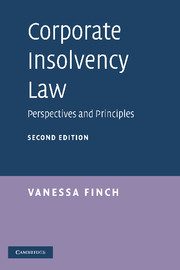Book contents
- Frontmatter
- Contents
- Acknowledgements
- Table of cases
- Table of statutes and other instruments
- List of abbreviations
- Introduction to the second edition
- PART I Agendas and objectives
- PART II The context of corporate insolvency law: financial and institutional
- PART III The quest for turnaround
- 6 Rescue
- 7 Informal rescue
- 8 Receivers and their role
- 9 Administration
- 10 Pre-packaged administrations
- 11 Company arrangements
- 12 Rethinking rescue
- PART IV Gathering and distributing the assets
- PART V The impact of corporate insolvency
- 18 Conclusion
- Bibliography
- Index
11 - Company arrangements
Published online by Cambridge University Press: 05 June 2012
- Frontmatter
- Contents
- Acknowledgements
- Table of cases
- Table of statutes and other instruments
- List of abbreviations
- Introduction to the second edition
- PART I Agendas and objectives
- PART II The context of corporate insolvency law: financial and institutional
- PART III The quest for turnaround
- 6 Rescue
- 7 Informal rescue
- 8 Receivers and their role
- 9 Administration
- 10 Pre-packaged administrations
- 11 Company arrangements
- 12 Rethinking rescue
- PART IV Gathering and distributing the assets
- PART V The impact of corporate insolvency
- 18 Conclusion
- Bibliography
- Index
Summary
This chapter looks at the statutory arrangements that companies may voluntarily enter into so as to deal with troubles or adapt to changes in market conditions. The two main procedures for effecting voluntary arrangements either within or outside administration or liquidation are schemes of arrangement under section 895 of the Companies Act 2006 and Company Voluntary Arrangements (CVAs), as provided for in Part I and Schedule A1 of the Insolvency Act 1986.
Before looking at these two methods, it should be emphasised that informal arrangements made contractually can, as noted in chapter 7, provide very useful ways of attempting rescues before there is need to resort to the formalities of section 895 or CVA provisions. Informal steps, moreover, may be taken confidentially and, in the international context, may provide a useful way of negotiating between different insolvency systems. Such contractual steps, however, possess a number of weaknesses. They are only binding on contracting parties and cannot tie dissenting parties to an agreement. They offer no form of moratorium to shield the company from its creditors and, even if approved by meetings of creditors and members, offer no protection from the enforcement of claims. Informal procedures may also lend themselves to domination by large secured creditors in a way unmatched by CVAs and section 895 processes.
Schemes of arrangement under the Companies Act 2006 sections 895–901
The roots of the scheme of arrangement lie in Victorian legislation but, as set out in the Companies Act 2006, the process allows a ‘compromise or arrangement’ to be agreed between a company and ‘its creditors, or any class of them’.
- Type
- Chapter
- Information
- Corporate Insolvency LawPerspectives and Principles, pp. 479 - 516Publisher: Cambridge University PressPrint publication year: 2009



